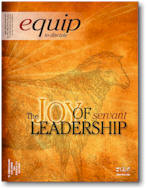To answer this question we need to go back and define what parts of the church involve Christian Education. The answer: everything the church does is Christian Education! Unless we clearly understand this principle true discipleship will not happen. With this understanding we can begin to comprehend what Paul meant when he said the job of the pastor (and note he really says pastor/teacher) is NOT to do the work of the ministry, but to EQUIP the members of his church to do it. This is discipleship – getting all the church operating according to the gifts given to them by the Holy Spirit.
To equip the church means that we are taking deliberate steps to train the people to do all, and more, than we were taught in seminary. One man cannot train everyone. Jesus trained only 12 (in reality three). But think about this – if a pastor trains three elders to do certain aspects of ministry, then he has multiplied what he would have done on his own. Each teaching and ruling elder has certain gifts to be used for the benefit of the church, therefore, if each elder was tasked with training three others with those same gifts we begin to see the multiplication of disciples take place as Jesus intended.
Training more teachers: One of the really sad facts about seminary training is that we get a great deal of training in how to preach, but little, if any, in how to teach. Yet how much more time do we spend teaching than preaching? Therefore, if the leadership does not have anyone who is gifted and trained to teach others to teach, then the church needs to bring in help, such as CE&P’s Regional Trainers.
Jesus did not say to go and preach the Gospel, he said to make disciples, of which preaching is only a part. The process of making disciples takes a lot more than simply listening to a sermon – it takes training, and that training means coming along side those saints we are equipping for works of ministry.
Click here to read entire publication in PDF (Acrobat Reader required)
What I have said here is nothing new or earth-shaking, but it is often forgotten by the pastor who is so busy doing the work of the ministry that he forgets that this is not his job! And if the church thinks it is, then they have not been taught properly. If this is the case for you, then start by re-prioritizing your time and job description so that there is time for true equipping. Start by selecting those who may be already doing works of ministry and help them equip others to do the same. This isn’t brain surgery; it is the difference between having one minister and 200 congregants over against having a church with 201 ministers! It’s your choice – do it the way you are, or do it God’s way. Which do you think he will bless?
One last point: If we are going to set our goal to train disciples, we must first ask what a “fully discipled” person looks like. For this, I am indebted to Perimeter Church for their well-thought description:
“A mature and equipped follower of Christ is one who:

 The question we are often asked in a variety of ways has to do with the role and function of leaders in the body of Christ, the church, and more broadly, in the kingdom. The question usually asked is, “Who are leaders and what are their performance expectations?”
The question we are often asked in a variety of ways has to do with the role and function of leaders in the body of Christ, the church, and more broadly, in the kingdom. The question usually asked is, “Who are leaders and what are their performance expectations?”  One of the hardest things I had to do as academic dean in a seminary in South Africa was to educate the faculty to understand the different between a “content driven curriculum” and a “process oriented curriculum.”
One of the hardest things I had to do as academic dean in a seminary in South Africa was to educate the faculty to understand the different between a “content driven curriculum” and a “process oriented curriculum.”